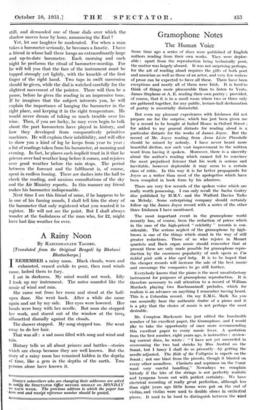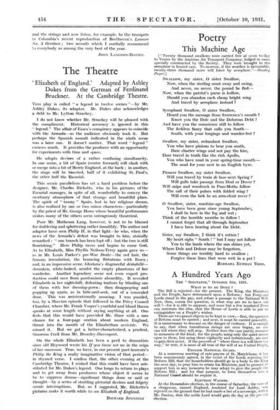Gramophone Notes
The Human Voice SOME time ago a series of discs were published of English authors reading from their own works. They were deplor- able : apart from the reproduction being technically poor, the matter was largely absurd. It was not surprising perhaps, for the art of reading aloud requires the gifts of both poet and musician as well as those of an actor, and very few writers of prose can be expected to have all these. There have been exceptions and nearly all of them were Irish. It is hard to think of things more pleasurable than to listen to Yeats, James Stephens or A. E. reading their own poetry ; provided, of course, that it is in a small room where two or three only are gathered together, for any public, lecture-hall declamation of poetry is essentially distasteful.
But even my pleasant experiences with Irishmen did not prepare me for the surprise, which has just been given me by a record to be bought at Imhof House in Oxford Street ; for added to my general distaste for reading aloud is a particular distaste for the works of James Joyce. But the record of Mr. Joyce reading from Anna Livia Plurabelle should be missed by nobody. I have never heard more beautiful diction, nor- such vast improvement to the written word from having it spoken. Moreover, there is a sincerity about the 'author's reading which cannot fail to convince the most prejudiced listener that his work is serious and inevitable, however deplorable it may seem to a certain class of critic. In this way it is far better propaganda for joyce as a writer than most of the apologetics which have been compiled in book form by his admirers.
There are very few records of the spoken voice which are really worth possessing. I can only recall the Sachs Guitry disc published by H.M.V. and the Walford Davies Talks on Melody. Some enterprising company should certainly follow up the James Joyce record with a series of the other three Irishmen I have mentioned.
The most important event in the- gramophone world recently has, of course, been the reduction of prices which in the case of the high-priced " celebrity " records is con- siderable. The serious neglect of the gramophone by high- brows is one of the things which stand in the way of still greater reductions. Those of us who rejoice in Mozart quartets and Bach organ music should remember that at present these are only made possible for gramophone repro- duction by the enormous popularity of such opera as I'm tickled pink with a blue eyed baby. It is to be hoped that the cheaper records will increase the sale of the best music' and encourage the companies to go still further.
Everybody knows that the piano is the most unsatisfactory instrument for purposes of gramophone reproduction. It is therefore necessary to call attention to a record of William Murdoch playing two Rachmaninoff preludes, which for realism is an advance on anything I remember having heard. This is a Columbia record. On my E.M.G. Mark Xa you can assuredly hear the authentic timbre of a piano and it is a pity that the choice of music is not perhaps the most desirable.
Mr. Compton Mackenzie has just edited the hundredth number of his excellent paper, the Gramophone, and I would like to take the opportunity of once more recommending this excellent paper to every music lover. A quotation from the first number, eight years ago, is instructive : review- ing current discs, he wrote : " I have not yet succeeded in overcoming the two bad shrieks by Miss Austral on the Sonat, but I fancy I shall do so presently—by getting the needle adjusted. The Ride of the Valkyries is superb on the Sonat ; not one blast from the piccolo, though it blasted on every other soundbox. Clarinets and sopranos on- the Font want very careful handling." Nowadays we complain bitterly if the bite of the strings is not -perfectly realistic and tympana boom out with perfect certainty. We have electrical recording of really great perfection, although less ;than eight, years ago little horns were put on the end of violins, and violins were used to double oboes in orchestral pieces. It used to be hard to distinguish between the wind and the strings and now listen, for example, in the trumpets in Columbia's recent reproduction of Beethoven's Leonore No. 3 Overture ; two records which I cordially recommend to everybody as among the very best of the year.
JOHN LANGDON-DAVIES.



















































 Previous page
Previous page